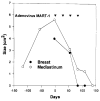Immunizing patients with metastatic melanoma using recombinant adenoviruses encoding MART-1 or gp100 melanoma antigens
- PMID: 9862627
- PMCID: PMC2249697
- DOI: 10.1093/jnci/90.24.1894
Immunizing patients with metastatic melanoma using recombinant adenoviruses encoding MART-1 or gp100 melanoma antigens
Abstract
Background: The characterization of the genes encoding melanoma-associated antigens MART-1 or gp100, recognized by T cells, has opened new possibilities for the development of immunization strategies for patients with metastatic melanoma. With the use of recombinant adenoviruses expressing either MART-1 or gp100 to immunize patients with metastatic melanoma, we evaluated the safety, immunologic, and potential therapeutic aspects of these immunizations.
Methods: In phase I studies, 54 patients received escalating doses (between 10(7) and 10(11) plaque-forming units) of recombinant adenovirus encoding either MART-1 or gp100 melanoma antigen administered either alone or followed by the administration of interleukin 2 (IL-2). The immunologic impact of these immunizations on the development of cellular and antibody reactivity was assayed.
Results: Recombinant adenoviruses expressing MART-1 or gp100 were safely administered. One of 16 patients with metastatic melanoma receiving the recombinant adenovirus MART-1 alone experienced a complete response. Other patients achieved objective responses, but they had received IL-2 along with an adenovirus, and their responses could be attributed to the cytokine. Immunologic assays showed no consistent immunization to the MART-1 or gp100 transgenes expressed by the recombinant adenoviruses. High levels of neutralizing antibody were found in the pretreatment sera of the patients.
Conclusions: High doses of recombinant adenoviruses could be safely administered to cancer patients. High levels of neutralizing antibody present in patients' sera prior to treatment may have impaired the ability of these viruses to immunize patients against melanoma antigens.
Figures


References
-
- Rosenberg SA. Development of cancer immunotherapies based on identification of the genes encoding cancer regression antigens. J Natl Cancer Inst. 1996;88:1635–44. - PubMed
-
- Rosenberg SA. Cancer vaccines based on the identification of genes encoding cancer regression antigens. Immunol Today. 1997;18:175–82. - PubMed
Publication types
MeSH terms
Substances
Grants and funding
LinkOut - more resources
Full Text Sources
Other Literature Sources
Medical

